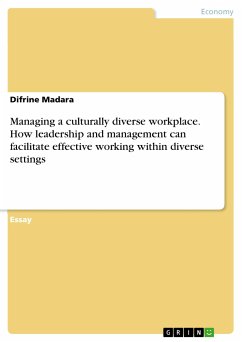Seminar paper from the year 2021 in the subject Leadership and Human Resource Management - Miscellaneous, grade: 1,0, Hult International Business School, course: Business Teamwork and Collaboration:, language: English, abstract: More diversity automatically results in better performance. This assumption is a mostly incorrect contemplation commonly assumed by managers and organisations. In fact, the increasing globalisation of markets and the alignment of diverse teams lead to changes in business operations: Stakeholders originate from countries that are culturally different and have contrasting values, resulting in intercultural overlap situations that affect management practices, individual work attitudes, communication, and negotiation. New kinds of difficulties thus arise that need to be addressed appropriately. Most diversity measures in companies tend to focus on how businesses can become more diverse, instead of managing this diversity, so-called intercultural management, which necessitates whole other procedures and metrics. This literature review defines intercultural management, demonstrates leadership styles that should be used by executives, who attempt to counteract the above-mentioned problems as well as examine strategies of interculturality in the leadership process.
Dieser Download kann aus rechtlichen Gründen nur mit Rechnungsadresse in A, B, BG, CY, CZ, D, DK, EW, E, FIN, F, GR, HR, H, IRL, I, LT, L, LR, M, NL, PL, P, R, S, SLO, SK ausgeliefert werden.







![The basics of teamwork [Hausarbeit plus Präsentation] (eBook, PDF) The basics of teamwork [Hausarbeit plus Präsentation] (eBook, PDF)](https://bilder.buecher.de/produkte/37/37625/37625926n.jpg)

